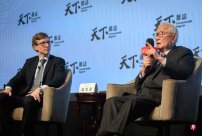(Brussels News) Fu Cong, head of the Chinese envoy of the Chinese EU, said that the Dutch decision to join the United States' technical export control over China does not conform to the interests of the Netherlands and European countries, and it is not economically in the interests of the United States.
According to the Chinese EU website website on Saturday (February 11), Fu Cong attended the event organized by the European Think Tank European Policy Center on Wednesday (February 8).Regarding how to view the Dutch recently decided to join the United States' export control to China, Fu Cong replied that China believes that this is a typical case of political intervention technology and commodity trade.For political and geopolitical considerations, the United States tries to eliminate China to eliminate global supply chains or decimed with China to achieve its purpose of curbing China.He believes that the world should not allow this dangerous trend to continue to develop.
In October 2022, the Bayeng government announced export control measures to strictly restrict American manufacturers with the most advanced chip manufacturing equipment to Chinese customers.Japan and the Netherlands also joined the operation in February 2023.
Fu Cong also talked about the Taiwan issue in the event. He reiterated that a Chinese principle is the red line of China and the basis of China -Europe relations.But now some people seem to think that any country has the right to explain a Chinese principle.
He pointed out that some EU members and senior officials from EU institutions visited Taiwan, and even discussions on the signing of investment agreements with the EU and Taiwan.Fundamentally changes or shakes the basis of bilateral relations.
For Europe's concerns about Taiwan's increasing stance, Fu Cong said that he didn't think China was tough.China has actually adopted a consistent position in the past few decades, but it is expressed with a clearer wording.China does not deny that it takes a tough position, but every time it is done, it is a response to external provocation.


